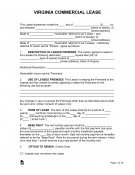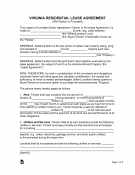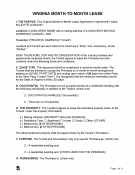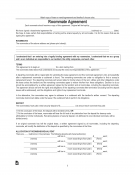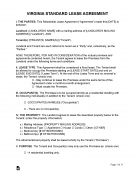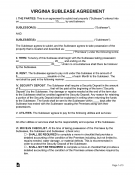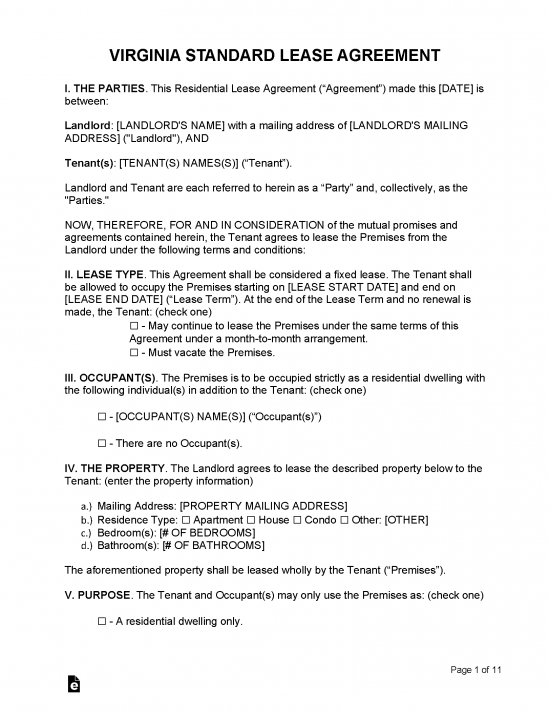Virginia lease agreements set the terms of a tenant’s lease of a landlord’s property in exchange for monthly rent. The agreements will contain the expected monthly rent, identify who is responsible for which utilities, and specify other conditions of the lease, such as whether pets are permitted. Lease agreements can be helpful because they make both the obligations of landlords and tenants clear at the outset, and may help prevent disputes during a tenancy.
Contents
- Virginia Lease Agreements: By Type (6)
- Landlord-Tenant Laws
- Handbooks and Guides
By Type (6)
- Commercial Lease Agreement
- Month-to-Month Lease Agreement
- Rent-to-Own Lease Agreement
- Roommate Lease Agreement
- Standard Lease Agreement
- Sublease Agreement
Download: Adobe PDF, MS Word, Rich Text Format
Download: Adobe PDF, MS Word, Rich Text Format
Month-to-Month Lease Agreement
Download: Adobe PDF, MS Word, Rich Text Format
Download: Adobe PDF, MS Word, Rich Text Format
Download: Adobe PDF, MS Word, Rich Text Format
Download: Adobe PDF, MS Word, Rich Text Format
Landlord-Tenant Laws
Statutes – Title 55.1, Chapter 12 (Residential Landlord and Tenant Act)
Required Disclosures
Defective Drywall – If a landlord is aware that a dwelling unit contains defective drywall, then the landlord must disclose this to tenants leasing the property (§ 55.1-1218).
Lead-Based Paint Disclosure – Under federal law, for a lease of any property with a dwelling unit constructed before 1978, a landlord must disclose to tenants that lead-based paints pose serious health hazards.
Methamphetamine Disclosure – If a property was at one time home to a methamphetamine lab, and was not subsequently cleaned in accordance with § 32.1-11.7, then the landlord must present this form to tenants prior to the beginning of a tenancy (§ 55.1-708).
Military (Air) Zone Disclosure – If the property falls within the area defined in a local zoning map as being part of the noise or accident zone of an airbase, the landlord must disclose this information to the tenant (§ 55.1-1217).
Mold – A landlord must disclose, in the move-in checklist included immediately below, whether mold is present in a dwelling. If the checklist does not indicate the presence of mold, but a tenant encounters it, the tenant must inform the landlord within five (5) days of moving in (§ 55.1-1215).
Move-in Checklist – A landlord must, within five (5) days of a tenant moving into a property, provide the tenant with a written report identifying the condition of various parts of the property. This report shall be deemed correct unless the tenant objects, in writing, within five (5) days of receiving it (§ 55.1-1214).
Notices – A lease agreement should specify how official notices are to be exchanged between parties, and should contain a physical address or email address at which the landlord or the landlord’s agents may be reached (§ 55.1-1202(A)).
Planned Demolition – A landlord must disclose to the tenant whether there are plans to demolish the property being rented within six months of the beginning of the lease (§ 55.1-1308).
Ratio of Utilities – For properties that rely on sub-metering or other ways of splitting utility costs among multiple units on a property, landlords must disclose to tenants the method by which such costs will be assessed (§ 55.1-1212).
Security Deposit Laws
Maximum Amount ($)
A landlord may seek a security deposit of no more than two (2) months’ rent (§ 55.1-1204).
Returning to Tenant
A landlord must return a security deposit to a tenant within forty-five (45) days of the expiration of the termination of a tenancy or the date the tenant vacates the dwelling unit, whichever occurs last. The landlord may retain a portion of the security deposit only to (i) account for owed rent, (ii) remedy damage done to the property during the tenancy apart from wear-and-tear, or (iii) cure violations or breaches of the lease agreement.
The landlord must provide a written itemization of the reasons for any amount retained, along with the remaining funds, if any, to the tenant within the forty-five (45) day time period. The tenant should provide a forwarding address to the landlord for forwarding of the security deposit and itemization before the completion of the tenancy.
If the tenant fails to do so, the landlord shall hold the security deposit in escrow for one (1) year after the conclusion of the forty-five (45) day time period. If the tenant fails to claim it in this period, then the landlord should deliver any remaining funds to the Virginia State Treasurer as unclaimed property (§ 55.1-1226).
When is Rent Due? (grace period)
Virginia statutes do not specify when rent is due which means that the landlord and tenant may set a date in the lease agreement. or State law does not require a grace period, but see the section below on late rent penalties.
Eviction Notice (non-payment)
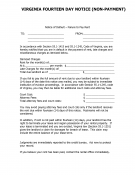 14-Day Notice to Pay or Quit – If a tenant fails to pay rent on the date due, the landlord may give notice to the tenant informing him or her of the landlord’s right to begin eviction proceedings within fourteen (14) days. If the tenant does not pay the amount owed within fourteen (14) days, then the landlord may terminate the tenancy. Landlords that own more than four (4) units, or that own a percentage of more than four (4) units, may give notice, but are also required to offer tenants a payment plan that does not include late fees (§ 55.1-1245).
14-Day Notice to Pay or Quit – If a tenant fails to pay rent on the date due, the landlord may give notice to the tenant informing him or her of the landlord’s right to begin eviction proceedings within fourteen (14) days. If the tenant does not pay the amount owed within fourteen (14) days, then the landlord may terminate the tenancy. Landlords that own more than four (4) units, or that own a percentage of more than four (4) units, may give notice, but are also required to offer tenants a payment plan that does not include late fees (§ 55.1-1245).
Download: Adobe PDF
Maximum Fees ($)
Late Rent Penalties
Landlords may not charge a late fee for rent unless the rent is delivered more than five (5) days after the date on which it is due. If a landlord intends to charge a late fee, the fee must be named in the lease agreement, and cannot exceed the lesser of ten percent (10%) of the monthly rent or 10 percent (10%) of the amount owed (§ 55.1-1204).
NSF Checks
Landlords may charge a fee for providing a rent check linked to an account with insufficient funds to carry it, but the fee must be named in the rental agreement, and in no case may it exceed $50 (§ 55.1-1200).
Tenant’s Unclaimed Property
A landlord’s obligations toward a tenant’s unclaimed personal property depending on the circumstances of the tenant’s departure. If the landlord is terminating the lease, the landlord must provide the tenant with a termination notice, indicating that personal property left behind may be disposed of within twenty-four (24) hours of the termination; if the landlord believes the tenant has abandoned the property, the landlord must provide written notice that personal property in the dwelling unit may be disposed of within seven (7) days; and in all other circumstances, the landlord must provide the tenant with written notice that all personal property left behind may be disposed of within ten (10) days.
The landlord must store the property for the amount of time specified in the notice and must allow the tenant to reclaim the property at reasonable times, but the landlord does not have a duty of care toward the property while it is in storage. After the period of time specified in the notice has concluded, the landlord may dispose of the property or sell it. The proceeds from a sale of the property may be applied toward storage costs or outstanding debts owed by the tenant, with any remainder being delivered to the tenant in the manner described above in the section on security deposits (§ 55.1-1254).
